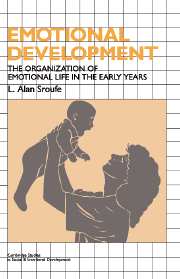Book contents
- Frontmatter
- Contents
- Preface
- Part I The nature of emotional development
- 1 A developmental perspective on emotions
- 2 Conceptual issues underlying the study of emotion
- 3 Emotion and the organization of development
- Part II The unfolding of the emotions
- Part III Emotional development and individual adaptation
- References
- Index
3 - Emotion and the organization of development
Published online by Cambridge University Press: 16 September 2009
- Frontmatter
- Contents
- Preface
- Part I The nature of emotional development
- 1 A developmental perspective on emotions
- 2 Conceptual issues underlying the study of emotion
- 3 Emotion and the organization of development
- Part II The unfolding of the emotions
- Part III Emotional development and individual adaptation
- References
- Index
Summary
At the core of the latest biological, psychological and psychoanalytic models of development is an epigenetic principle which stresses the interactive nature of development, the continuing dialectic between the developing organism and its changing environment.
Schore (1994)A general theory of development should conceive of organisms as active systems, maintaining some degree of integrity, stability, or self-regulation [and] should view change as a transition toward complexity of organization, involving multilevel functioning and organized wholes.
Santostefano (1978)The issues pursued in this chapter concern the nature of development and the place of emotion in the study of human development more generally. A particular viewpoint on development, namely an “organizational” perspective, is advanced. The integrated and organized nature of development is illustrated, and a number of themes in early development are outlined. The implications of the general viewpoint and these particular themes for the traditional problems in emotional development are sketched here and drawn out in detail in subsequent chapters.
Two primary principles of development will be used to organize much of the discussion to follow. These two principles, synthesized from the work of major developmentalists such as James Mark Baldwin (1897), Werner (e.g., Werner & Kaplan, 1963; see also Glick, 1992), and Piaget (1952), are unity and emerging complexity.
- Type
- Chapter
- Information
- Emotional DevelopmentThe Organization of Emotional Life in the Early Years, pp. 38 - 52Publisher: Cambridge University PressPrint publication year: 1996
- 1
- Cited by

